
Volume VI/Issue 7/October 2021


From The Editorial Desk
WE MUST PRAY
The book of Judges describes a time when Israel, God’s own people who were called to be a supernatural testimony in the earth, began to deal deceitfully with His presence. They refused to walk honestly with God and grew casual in their worship of Him, if not casting off the worship of God altogether.
Dealing deceitfully with God will always result in powerlessness, which eventually gives way to the enemies of that society. By enemies, I am referring to those who do not know God, who have no desire to know Him, and who do not want anyone else in relationship with Him. You and I are living in a day very similar to that period of time in the Old Testament.
It was during harvest season that Israel’s enemies, in this case the Midianites, came to devour everything that was being gathered by the people of God (see Judges 6:2-3). They intended to bring the Israelites to an impoverished place so as to render them unable to fulfill their God-given purpose on the earth. Knowing that they were far outnumbered by the enemy, which the Scriptures actually describe as being so numerous that they covered the earth like the sand, the children of Israel began to cry out to the Lord—as is beginning to happen in our day.
God hears the cry of the single mother whose children are out on the streets; the cry of the father who doesn’t know how he is going to provide for his family. He hears the cries of those who read the news and see the horrific crimes that are becoming a daily occurrence in this generation.
My dear friend, we must pray! The day and hour demands that those of us who still know the mercy of Jesus Christ begin to plead for our country. I believe that only a grassroots awakening of God’s people can offer a season of reprieve from the very dark days just ahead of us. How wonderful it would be if the record of heaven stated that 2021 was the year in which you and I began to pray for the people of this land with a faith and intensity only God could have given us!


Have a Personal Relationship With the Trinity
Saint Alphonsus gives us the following eternal maxim: "We ought to live on this earth as if there were nothing in existence but God and ourselves." Our relationship with God is the most important relationship in our lives. All we are and have comes from God.
Unfortunately many have distanced themselves from God, as if He is unapproachable. We approach the tabernacle as if it were a bread box. Yes we believe Jesus is truly present, but we do not appreciate His holy presence.
God desires far more than our obedience. He desires an intimate relationship with us as close friends.
Let us consider the most intimate relationship on earth, which Saint Paul calls a great sacrament, marriage. (Ephesians 5:32) "Wherefore a man shall leave father and mother, and shall cleave to his wife: and they shall be two in one flesh." (Genesis 2:24) In marriage the couple unite on all levels from the spiritual to the carnal. In a good marriage, the husband and wife love each other. They want to spend time with each other. They want to visit with each other. Sometimes they want to merely sit and be with each other, not saying a word.
As with all relationships, there is a due order to be observed: "Nevertheless let every one of you in particular love his wife as himself: and let the wife fear her husband." (Ephesians 5:33)
Now God wants us to be just as intimate with Him and get to know Him. The basic catechism tells us to "know, love and serve God." Notice that knowledge comes first, because we cannot love someone we do not know. Service comes last, because our service should proceed from the love of God, not because of some perceived duty: "If you love me, keep my commandments." (John 14:15) The greatest commandment is the commandment to love God.
Now love goes far beyond mere worship. Love comes from the heart. We know God loves us, because Sacred Scripture is full of the love of God for us. Now how is our love towards God? How to we get into a relationship with Him? How do we want people to relate to us?
What is prayer? Prayer is a conversation between God and our own self. Prayer takes the form of formal prayers in some cases. The liturgy is a type of prayer. However, prayer can be a simple conversation with God, pouring out the thoughts of our heart to Him. We pour out our desires for His honor. We pour out our own desires and ask Him to direct us on the right path. And yes, we pour out our evil desires, asking Him to take them away.
In prayer, we also listen to God's voice, which can come in many ways. It can come from a Scripture we are reading. He can speak to us through others. He can speak through animals as He did with Balaam in the Old Testament. (Numbers 22:21ff) A thought may pop into out mind showing us what God wills. Let us have our heart open to hear the voice of Almighty God.
"For my thoughts are not your thoughts: nor your ways my ways, saith the Lord." (Isaias 55:8) And this is the major problem. Our thinking is wrong, when it does not coincide with the way God thinks. "Now therefore saith the Lord: Be converted to me with all your heart, in fasting, and in weeping, and in mourning." (Joel 2:12) This conversion is a change of heart from evil ways to good ways. This change of heart requires a change in the way we think. "And be not conformed to this world; but be reformed in the newness of your mind, that you may prove what is the good, and the acceptable, and the perfect will of God." (Romans 12:2) We need to be brain washed, but in a good way. We need to wash away all worldliness from our way of thinking. "For the wisdom of this world is foolishness with God." (I Corinthians 3:19)
How do we learn to think like God? We must immerse ourselves in truth, purging out all wrong thinking, for wrong thinking is impure. How do we learn about someone? We spend time listening to their words. With God we have the Word of God, Sacred Scripture. "Keep thyself therefore, and thy soul carefully. Forget not the words that thy eyes have seen, and let them not go out of thy heart all the days of thy life. Thou shalt teach them to thy sons and to thy grandsons," (Deuteronomy 4:9)
"That which does not correspond to the truth and to the norm of morality has not, objectively, any right either to exist or to be propagated or to act." -Pope Pius XII
What this means is that error has no right to exist. This includes all error, no matter how small. In the December Olive Tree, there is an article, How to Obtain Purity of Thought. Saint Alphonsus says: "And above all, it is necessary to impress deeply on the mind certain fundamental spiritual maxims..." Since the introduction of this project last December, we have been considering these fundamental spiritual maxims.
In fact the whole Olive Tree is devoted to teaching us how to think like God thinks; as are the many other devotions and instructions on this website. Saint Augustine was told to take and read, and we should follow his example. Several Pope Speaks have been devoted to correcting wrong thinking. Last December Pope Speaks was devoted to this, correcting the incident from five centuries ago and calling it what it is, the Protestant Revolt.
The section on Principles of Life is extremely important. If we do not live by Catholic principles, then we should not call ourselves Catholics, for we are Catholics in name only. (Apocalypse 3:9) You will notice that sometimes there are only references to Sacred Scripture. This should prompt us to take out our Bibles and look them up.
Reread the August 2018 Pope Speaks: How We Take the Truth to Heart. Truth should be our constant companion.
There is an enemy to purity of thought that we must eliminate, inconsistency. A Pope Speaks was devoted to one aspect of this Moral Modernism. There is another aspect, holding a position that is self contradictory. People speak of oxymorons, such as a virgin prostitute. "A double minded man is inconstant in all his ways." (James 1:8) And yet many positions today are double-minded, which makes their followers inconstant. "Draw nigh to God, and he will draw nigh to you. Cleanse your hands, ye sinners: and purify your hearts, ye double minded." (James 4:8) Double mindedness comes from an impure heart.
In an early Pope Speaks the Pope wrote: "We need to consistently preach the Gospel, not debate the condition of the Church. The Church will not improve, until we do." If you want to get to heaven, you must heed the advice of the Gospels: "Do penance: for the kingdom of heaven is at hand." (Matthew 3:2) A footnote in the Douay reminds us: "'Do penance': Paenitentiam agite. Which word, according to the use of the scriptures and the holy fathers, does not only signify repentance and amendment of life, but also punishing past sins by fasting, and such like penitential exercises."
Our double-mindedness is a great obstacle we have placed between our self and Almighty God; an obstacle we must ask God to remove. We cannot have perfect charity, if we are double-minded in any way. And so let us consider the following prayer:
Dear Lord, I desire perfect charity. Please help me to fulfill my desire by the help of Thy grace, which I stand in need of. Remove from me all the obstacles I have placed between Thee and me. Help me to acquire all of the holy dispositions I need to come into complete union with Thy most holy will.
Notice we ask God to remove the obstacles we have placed between Him and our own self. We may have put them there, but we need His help to remove them. Just as adultery is a major obstacle to unity and intimacy in a marriage, double-mindedness and the holding of inconsistent positions is a major obstacle in our relationship with Almighty God.


How can we know the will of God ?
If we want to distinguish ourselves in the service to Christ we need to know His will. But the question is: how can we know the will of God?
In former times, God would speak through a sensible voice like the experience of Moses in the burning bush; or God would communicate through the message of an angel, such as seen in the annunciation of the Virgin Mary. Likewise God spoke through visions such as in Acts 10 concerning the animals we need to eat.
But today, even though the above ways are still possible, God speaks through His Son, our Lord Jesus Christ (cf. letter to Hebrews). And so in order to know God's will we are required to consult the following:
1. Scripture. The Holy Bible directly instructs us on how to handle things. For instance, in Matthew 18 we are advised to observe due process. "If your brother sins against you, come and talk to him..." Another instruction is, "Do not be overcome by evil, overcome evil with good" (Romans 14)
2. Circumstances in life. For example, God sometimes closes one door in order to open another door to us. One time our passport were held in the Italian embassy due to a delayed invitation from Milan, Italy. When I asked God, "why?" it so happened that there was an earthquake in Italy at that time. So, the Lord didn't allow us in order to protect us.
The Lord may deliberately cause as a delay to teach us to wait. Sometimes, He allows sickness to come to a person, as in the case of Ignatius of Loyola, just to teach him to meditate on God's will.
God is manifesting His will through lessons of trusting Him at all times, especially in moments we cannot understand His will. Example: the propagation of Novus Ordo Missae, the teachings of Vatican II. Why did God allow them to happen? Perhaps to punish us for our unrighteousness.
3. Promptings of the Holy Spirit. In the Spiritual Exercises of St. Ignatius it is advised to consider "what is conducive to the end for which we are created." And so, we need to asked ourselves, What am I doing? Why am I doing what I am doing? Is it related to my salvation and salvation of others? If it is related to the salvation of my soul, what are its advantages? What are its disadvantages? That which helping me attain the salvation of souls, I will take; that which is not helping me attain salvation of souls, I will just ignore.
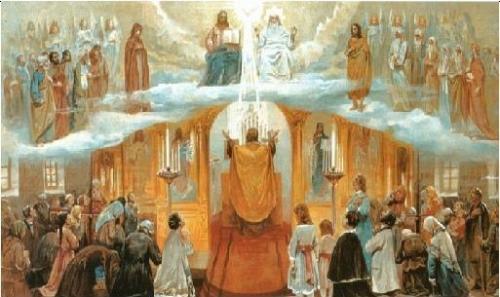
What Does Your Mother Do?
When we were little, an occasional question that we may have asked, or that someone may have asked of us, would be what our parents did for a living. “What does your father do?” “What does your mother do?”
And in response, we might say, “My father is a policeman, an architect, a ditch-digger.” “My mother is a nurse, an office worker, a homemaker.” All of these things are possibilities. But see that our mind draws our response to say even more than simply what our mother or father does, but to say what they are. We identify their occupation – in some way – with their being. We identify what they do with who they are. “My father is a ditch-digger.” “My mother is a homemaker.” And even further than this, we also identify a person’s relationship with their being. Because of relationship, we say that someone is our father, someone is our mother. They don’t simply “have” fatherhood or motherhood directed towards us. Rather we see that this relationship of parent and child fundamentally affects the very being of those people. I think any parent with enough self-awareness could agree and would attest that becoming a parent has effected a most profound change in their own being. Thus, more rightly than any other occupation, when asked what one’s parents do, the answer is truly, “My father is my father. My mother is my mother.”
Our Mother, the Church, strives to pass on that which she has received: the faith, once delivered to the Apostles. But notice this: the Church does not simply say things to us, publish letters, make things known after the fashion of secular news providers. That’s not what she calls us to, that’s not how she teaches us, her children, today.
“What does your mother do? My mother is such-and-such an occupation.” Here? The Church is our Mother. What does our Mother do? She is a pray-er. She is a worshipper. She is a glorifier.
The Liturgy is what she does. She wishes us to learn of that Faith once delivered, that Faith held and proclaimed by the fathers. We learn best by watching what is done. We learn best by participating in what is done. We learn and we grow only, only, only by being with our Mother the Church in her worship of her Divine Bridegroom.
For it is one thing simply to know, simply to say “yes” to the teachings of the Church. Even the devils can know that they are true. So what? The faith is not an intellectual exercise. The possession of all the so-called “truths of the faith,” without relationship to Christ, the Author of those truths, is no faith at all, no life at all. That necessary relationship is established only with and in Christ’s Immaculate Bride, the Church. And the Church incorporates us into her relationship with Christ only by what she does, and what she does is her Liturgy, her Liturgical prayer.
History bears this out. Where the Liturgy has ceased, the faith is invariably forgotten within a very short time. Even if a memory of the faith lingers, it is but that, a memory. And it soon becomes at the very best a parody, and the worst is simple apostasy.
On the other hand, even in times of the gravest persecution, when one – even if he or she is a simple solitary layperson – when that one person remains faithful to the Liturgical prayer of the Church, praying the hours, praying the Psalter, praying the Typica, joining their own hearts, their own minds, their own voices to the heart, the mind, and the voice of the Church as she does what she does and rightly worships and glorifies her Divine Spouse… there the Faith can be held. There the light of the Faith remains lit, even in the darkest of times.
This path is open to us all. Come! Come and see the profound difference made by relationship to the Church, effected by doing what she does, praying the Liturgical prayer of the Church. Then, truly, may we be children of the Immaculate Bride, then truly may we too be changed in our being, becoming children of the light.

The Funny Pharmacy
A joyful mind maketh age flourishing: a sorrowful spirit drieth up the bones. - Proverbs 17:22






Frequently Asked Questions

What are the most important things for a Catholic to know?
Without a strong spiritual life, it is impossible to discern the truth at any time in Church history, because these things are spiritually examined. (I Corinthians 2:14)
We need to spend a great deal of time in considering the truths in Sacred Scripture.
We need to have a thorough knowledge of the holy Catholic Faith.
Saint Alphonsus tells us to hear all of the sermons we are capable for. With modern technology, we can do this more easily.
We also should be reading holy things in addition to our reading of Sacred Scripture.
If you are not working seriously to become a saint, then you will not be able to understand what we are presenting here. Our priority here is to bring people to a knowledge and acceptance of the truth, the whole truth and nothing but the truth. (I Timothy 2:4)
Let us all pray: "Lord, make me a saint."
We invite you to spend time in visiting the various parts of our ministry that will help you on the road to heaven.
For answers to more frequently asked questions, click here: https://www.vaticaninexile.com/frequently_asked_questions.php
The Pope Speaks: October 2021
Has Divine Mercy Become Like the Rosary?

There is much controversy about the devotion to Divine Mercy, especially the chaplet and novena. Many traditional minded Catholics reject the idea of Divine Mercy, and yet this idea is in Sacred Scripture in many places. Read the 135th Psalm, which begins: "Praise the Lord, for he is good: for his mercy endureth for ever." Saint Gertrude also had a devotion to both the Sacred Heart and to Divine Mercy.
Those who accept the Divine Mercy devotions, the chaplet and novena, usually accept the promises, which state that the most hardened sinner can be converted by this devotion.
Before we continue, let us consider this question: "Can the Rosary be abused?"
This may sound like a strange question, but any devotion can be misused. Saint Louis de Montfort enumerates a number of false devotees to the Blessed Virgin Mary. "I find seven kinds of false devotees and false devotions to our Lady, namely, (1) the critical devotees; (2) the scrupulous devotees; (3) the external devotees; (4) the presumptuous devotees; (5) the inconstant devotees; (6) the hypocritical devotees; and (7) the interested devotees." (True Devotion to Mary)
We shall only consider external devotees. "External devotees are persons who make all devotion to our Blessed Lady consist in outward practices. They have no taste except for the exterior of this devotion, because they have no interior spirit of their own. They will say quantities of Rosaries with the greatest precipitation; they will hear many Masses distractedly; they will go without devotion to processions; they will enroll themselves in all sorts of confraternities, without amending their lives, without doing any violence to their passions, or without imitating the virtues of that most holy Virgin. They have no love but for the sensible part of devotion, without having any relish for its solidity." Today we can add they may be faithful to recite the Divine Mercy Chaplet and the Divine Mercy Novena.
External devotees are into devotions not into devotion. Hugh of Saint Victor says: "Devotion is a ready turning of the soul towards God, by means of a tender and humble affection; humble, on account of the experience of our own frailty; tender, from the consideration of God's goodness."
"Religion clean and undefiled before God and the Father, is this: to visit the fatherless and widows in their tribulation: and to keep one's self unspotted from this world." [James 1:27] External devotees are pursuing devotions in the hope that they can keep their pet sins. They are spotted by the world and worldliness. "And be not conformed to this world; but be reformed in the newness of your mind, that you may prove what is the good, and the acceptable, and the perfect will of God." (Romans 12:2)
"And if any man think himself to be religious, not bridling his tongue, but deceiving his own heart, this man's religion is vain." [James 1:26] How many do not bridle their tongue or today their keyboard on social media? Some of the posts from those who claim to be the most fervent traditional minded Catholics are disgusting. And it has gotten worse since the Ides of March of 2020 and the Corona Virus. The reaction to the reaction to COVID-19 is often horrible.
True devotion is aimed at helping us live a life desiring the greatest perfection as Scripture reminds us. "Be you therefore perfect, as also your heavenly Father is perfect." (Matthew 5:48) God has provided us with devotions for this purpose. Let us remember this, when we say our next Rosary or chaplet. Let us ask for the grace of perfection, which will bring us through conversion, if necessary.
Saint Angelus foretold the stigmata of Saint Francis, and Saint Dominic said: "One day, Brother Angelus, to your Order of Carmel the Most Blessed Virgin Mary will give a devotion to be known as the Brown Scapular, and to my Order of Preachers she will give a devotion to be known as the Rosary. And one day, through the Rosary and the Scapular, she will save the world." Many rely on the Sabbatine Privilege, but have no idea what is required to obtain this privilege. Saint Alphonsus says: "To obtain the Sabbatine indulgence, chastity must be observed according to each one's state (of life), and the little office of the blessed Virgin or the canonical office recited. The office may be supplied by the fasts of the church and abstinence on Wednesday and Saturday; or if these fasts and abstinences are not possible, by some works equally painful and meritorious, as prescribed by the priest authorized to receive members."
Many wear the Scapular and say the Rosary, but half heartedly at best. Saint Ignatius of Loyola said: "Of a hundred persons devoted to prayer, more than ninety are self-willed." Self-will is devilish. Unfortunately for many, the Rosary has merely become a litany of words recited once a day without any devotion. "And the Lord said: Forasmuch as this people draw near me with their mouth, and with their lips glorify me, but their heart is far from me, and they have feared me with the commandment and doctrines of men:" (Isaias 29:13)
A priest purchased a beautiful icon of Mary for his church. He had it erected and commanded his staff always keep flowers before it. In a sermon he told the following story, which he attributed to the holy Cure of Ars, Saint John Vianney: "A certain man jumped from a bridge and committed suicide. His widow was inconsolable. The holy Cure of Ars went to her to console her, stating that he had made an Act of Contrition at the last moment and been saved, because he had a habit of bringing flowers to a road-side statue of the Blessed Virgin Mary." Immediately after the sermon, several people were distressed by the story and looked to see if it was true. In actual fact, the man had fallen, not jumped from the bridge. He had repented as he lay dying by the river.
There is an interesting book, Waiting for the Apocalypse. The second daughter in the family wrote it. They were an early day traditional minded family in the 1970's. The mother had the habit of constantly reciting the Rosary while going through her day, while her father spent his free time in his office studying the conspiracy. And there are many families like this today. Only one of their children is a traditional minded Catholic. These parents neglected their children. They would have been far better off not worrying about the conspiracy and yes, saying only one Rosary a day fervently. They failed to spend quality time with their children and thus lost them to the Faith.
The Rosary and Scapular cannot save the world or even families, unless they are partnered with the Catholic way of life as laid out in Sacred Scripture.
Let us return to how the Rosary is misused is similar to how the Divine Mercy devotion is misused. Many are faithful to recite the chaplet at three in the afternoon, but how many are taking to heart what the devotion is truly about. They are merely rattling off words.
There are many alleged apparition sights throughout the world. There are devotees to these apparitions, and gatherings are made at certain times as dictated by the apparition. While waiting for an event, the devotees have the habit of reciting Rosary after Rosary. When the Divine Mercy chaplet became popular they decided to recite the Rosary, then the Chaplet, switching back and forth for some variety. Instead of chasing alleged apparitions, let us pursue holiness, which can be done right at home. In fact, Saint John Chrysostom calls the home a little church.
The purpose of devotion is to help us become saints, not merely to devote some time to rattling off words with no change of heart to go with them. For many, the time of mercy will soon end, and God will judge us. And the reason is simple, we do not have true devotion, which Saint Thomas Aquinas tells us is to do whatever God commands us.
Read more! The Pope Speaks - May 2019 - Devotion to Mary


Saint Mark the Ascetic
On The Spiritual Law

152. Do not listen to talk about other people's sins. For through such listening the form of these sins is imprinted on you.
153. When you delight in hearing evil talk, be angry with yourself and not with the speaker. For listening in a sinful way makes the messenger seem sinful.
154. If you come across people gossiping idly, consider yourself responsible for their talk - if not on account of some recent fault of your own, then because of an old debt.
155. If someone praises you hypocritically, be sure that in due course he will vilify you.
156. Accept present afflictions for the sake of future blessings; then you will never weaken in your struggle.
157. When someone supplies your bodily needs and you praise him as good in his own right apart from God, he will later seem to you to be evil.
158. All good things come from God providentially, and those who bring them are the servants of what is good.
159. Accept with equanimity the intermingling of good and evil, and then God will resolve all inequity.
160. It is the uneven quality of our thoughts that produces changes in our condition. For God assigns to our voluntary thoughts consequences which are appropriate but not necessarily of our choice.
Saints from East and West
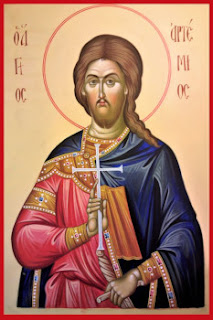
20 October - Saint Artemius.
The Holy Great Martyr Artemius was a prominent military leader during the reign of the Equal-to-the-Apostles emperor Constantine the Great, and later also of his son and successor Constantius.
Artemius held many awards for distinguished service and courage, and he was appointed viceroy of Egypt. In this official position he did much for spreading and strengthening Christianity in Egypt.
The emperor Constantius was succeeded on the throne by Julian the Apostate (361-363). Julian in his desire to restore paganism carried on an implacable struggle with Christianity, sending hundreds to their death.At Antioch he ordered the torture of two bishops unwilling to forsake the Christian faith. During this time Saint Artemius arrived in the city and publicly denounced Julian for his impiety. The enraged Julian subjected the saint to terrible tortures, after which they threw the great martyr Artemius into prison. During the time of prayer which the saint offered to the Lord, Christ Himself appeared to him surrounded by angels and said, "Take courage, Artemius! I am with thee and wilt preserve thee from every hurt which the tormentors may inflict upon thee, and already have I prepared thy crown of glory. Wherefore as thou hast confessed Me before the people on earth, so also shalt I confess thee before Mine Heavenly Father. Therefore, take courage and rejoice, thou shalt be with Me in My Kingdom." Hearing this of the Lord Himself, Artemius rejoiced and began fervently to offer up glory and thanksgiving to Him.
On the following day, Julian demanded that the great martyr Artemius honour the pagan gods. Meeting with steadfast refusal, the emperor resorted to torture. The saint endured all without a single moan. The saint then predicted to Julian that he would soon receive just recompense for the evil done by him to Christians. Julian became furious and resorted to even more fiercesome tortures, but they did not break the will of the saint, and finally the great martyr Artemius was beheaded (+362).
His remains were buried by Christians. And after the death of the holy great martyr Artemius, his prophecy about the impending perishing of Julian the Apostate came true.
Julian left Antioch for a war with the Persians. Near the Persian city of Ctesiphon he came upon an elderly Persian, who agreed to betray his countrymen and guide Julian's army. But the old man deceived Julian and led his army into an impassable place in the Karmanite wilderness, where there was neither food nor water. Worn down by hunger and thirst, the Greco-Roman army of Julian had to do battle against fresh Persian forces.
Divine retribution caught up here with Julian the Apostate. At the time of battle he was mortally wounded by an unseen hand and an unseen weapon. Julian groaned deeply, and dying, he said: "Thou hast conquered, Gallilean!" After the perishing of the apostate-emperor, the relics of the great martyr Artemius were transferred with honour from Antioch to Constantinople.
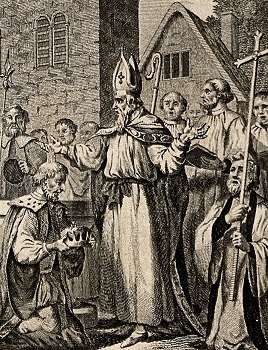
10 October - Saint Paulinus of York.
Saint Paulinus is celebrated as the first apostle of the largest and - at that time - the most powerful of the kingdoms of the English; he was one of the second group of missionaries sent to England by Pope Saint Gregory I.
When Edwin, King of Northumbria, demanded in marriage Ethelburga, sister of Edbald, King of Kent, promising liberty and protection with regard to her religion, no one was judged more proper to be her guardian and to undertake this new harvest than Paulinus. He was ordained bishop by Saint Justus, Archbishop of Canterbury, in 625, and accompanied the young queen to her husband.
It was a continual affliction to his heart to live in the midst of a people who were strangers to the true worship of God, and all his preaching and endeavours to make Him known and served by them were at first unsuccessful. But his prayers were at length heard. King Edwin was brought over to the faith, and he was baptized by Saint Paulinus at York at Easter in 627. The king's two sons by his first wife and many of the nobles and people followed Edwin's example, and the crowds that flocked to receive baptism whom Saint Paulinus, when among the Deiri, baptized in the river Swale, near Catterick. Edwin's residence among the Bernicians was at Yeavering in Glendale, and in that country Saint Paulinus baptized in the river Glen. He once spent thirty-six days in this place, instructing and baptizing the people day and night. The name Pallingsburn is said to preserve the memory of one of these baptizings ("Paulinus's Brook"), and tradition associates him also with Dewsbury, Easingwold and elsewhere.
The apostolate of Saint Paulinus was chiefly in the south of Northumbria, and he crossed the Humber and preached the faith to the inhabitants of Lindsey. Here he baptized Blecca, the king's reeve, at Lincoln, and there built a church in which, after the death of Saint Justus, he consecrated Saint Honorius as archbishop of Canterbury. Assisted by his deacon James he baptized a great number of people in the river Trent at Littleborough, as Saint Bede heard, through the abbot Deda, from one of the neophytes on that occasion. From the same source he learned that Saint Paulinus was "a tall man, stooping a little, with black hair, thin face, and narrow aquiline nose, venerable and awe-inspiring in appearance."
Pope Honorius I sent the pallium to Saint Paulinus as the northern metropolitan in England, and in his letter of congratulation to King Edwin upon his conversion he wrote, "We send pallia to the metropolitans Honorius and Paulinus, that whenever it shall please God to call either of them out of this world the other may ordain a successor for him by virtue of this letter." Saint Paulinus, however, never wore that pallium in his cathedral, and when the letter reached England Edwin was dead. For, nearly two years before it was written (which shows the difficulties of communication), the pagan Mercians under Penda, reinforced by Christian Britons from Wales, invaded Northumbria, and at the battle of Hatfield Chase Edwin was slain. Most of the work of Paulinus in Northumbria was undone and, leaving the deacon James in charge of the church of York, he conducted Queen Saint Ethelburga with her two children and Edwin's grandson by Osfrid into Kent by sea. As the see of Rochester was at that time vacant, Saint Paulinus was asked to administer it, which he did for ten years, "until he departed to Heaven with the glorious fruits of his labours."
He was probably at least sixty when he came south with Saint Ethelburga, and it was out of the question that he should return to the confusion and turmoil of Northumbria. Saint Bede says that his locum tenens, the faithful James, was a holy man who, by long teaching and baptizing there, "rescued much prey from the power of the old Enemy of mankind." When peace came again to his church "he began to teach many to sing according to the manner of the Romans." Saint Paulinus died on October 10, 644, at Rochester, leaving his pallium to the cathedral and a golden cross and chalice he had brought from York to Christ Church at Canterbury.

Advice You Can Bank On
A Catholic Perspective On Finances
As we learned in last month’s article the reasons and consequences of borrowing money, likewise we can learn and understand what it means to save for large purchases while still being able to tend to our daily needs.
As with anything, there are steps we must take to produce the results we are after, and know that sometimes patience will be a key factor in the outcome we hope to achieve. The reality is, most of us are in debt, and in order to save, we must be free of this debt first. Depending on how much debt we have and how much income we take in will depend on how long it will take to become free from our creditors. This is where patience and fortitude come in to play.
Before we can start, we must make sure that we have some money set aside for emergencies. This is money that we don’t touch, unless there is an absolute need to do so. Start with $1000 set aside for unexpected occurrences. It is true that we never know what will come with tomorrow, and so although things may be fine today, tomorrow may have a different story. This amount of money can be greater than $1000, depending on your specific situation, but it should not be less than that. It’s possible that it may take you some time to accumulate that amount, and that is ok. Consider it practice for the next steps that we will cover.
Once you have the $1000 saved, keep the money safe. You can keep it in your house, in a place you will remember (NOT in a fireplace or stove!), or you can keep it in a savings account at the bank. It doesn’t matter so much where it is stored, so long as it sits and is not a temptation to spend or use it, unless there is an emergency. An emergency would constitute a loss of work, or a medical situation that arises unexpectedly, as a couple of examples.
The first step in being able to save money, will be to not. This seems counterintuitive, but the idea is simple: if you are in debt, any money you set aside (after you have come up with your emergency fund) should be going to your creditors first. “…Then he saith to them: Render therefore to Caesar the things that are Caesar's; and to God, the things that are God's.” (Matthew 22:21)
Before we start to pay off our debt, we must know how much of it we have and how much income we take in on a monthly basis. Perhaps our income fluctuates some, or perhaps it’s fairly static. Either way, we can adjust what we send out each month based on this amount. Creating a written budget for this process is the easiest way to accomplish this. If you are savvy on the computer, Excel is an excellent place for such a budget. If not, a piece of paper (or notebook) and a calculator do just fine. Add up your monthly income, including all expected income for the remaining month. Then, add all your necessary expenses for the month, such as groceries, fuel, electricity, and water. "Remove far from me vanity, and lying words. Give me neither beggary, nor riches: give me only the necessaries of life:" [Proverbs 30:8] Finally, add all you minimum payments of debts (credit cards, loans, family members, etc.) that you have above and beyond your regular monthly bills. Take your income for the month and subtract the two totals you came up with for bills and debts. This is what you have left over to start the next process in the steps to becoming debt-free and saving money.
Now that you know what you have left over each month, on a separate list, write out each of your debts from smallest to largest. If you have a mortgage, do not include it on this list. That will come later. In a space next to each amount of total debt owed to that creditor, write out your monthly minimum payment amount. This is for reference, as we know that you will already be paying at least that amount per month.
Let’s say you have $500 left over after paying your expenses for the month. Depending on the total amount of your smallest debt, take all, or a portion of what you have left over at the end of the month and apply it to that debt. If, for example, your smallest debt owed was $300, you would apply the full $300 to that debt, and take the remaining $200 and apply it to your next debt. This is called the “debt snowball”. In this scenario, we are not paying attention to interest rates, but rather debt amounts from smallest to largest. We do this so we see an immediate reduction in debt and a very visible result of our hard work.
While you are using your left over money at the end of the month to tackle your debts, continue paying the minimum payments on each of your other debts each month.
An example:
|
Monthly Income |
$3000 |
|
Monthly Expenses |
$2000 |
|
Minimum Debt Payments |
$500 |
|
Left Over |
$500 |
Smallest to largest debts, excluding any mortgage:
|
Debt |
Amount |
Minimum payment |
|
Credit Card 1 |
$300 |
$20 |
|
Credit Card 2 |
$500 |
$30 |
|
Car Loan |
10000 |
$150 |
|
Loan |
15000 |
$200 |
In this example, Credit Card 1 has been paid off using your left over money for that month. The minimum payment of $20 will carry forward to Credit Card 2.
This step is repeated each month until our debts are paid off. We will continue each month carrying forward the minimum debt payments, even after a debt has been paid off, as they have already been calculated into your expenses. Although you no longer have that debt and it’s minimum monthly payment, use it to your advantage by calculating it in your extra money at the end of the next month.
For very many of us, this can take a long time. A year’s time is not uncommon, so don’t be alarmed. Consider how long it would take if only making the minimum payments each month, in some cases it can take more than 20 years!
Using this guidance will help you to achieve your goal of saving, whether it is for a large purchase, retirement, or being able to give more to causes you are involved in. It will also free us of interest and allow us freedom from borrowing, which was covered extensively in last month’s article.

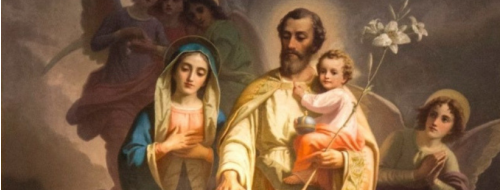 Family Matters
Family Matters
The Home Is a Little Church
Saint John Chrysostom said this many years ago. A church is more than a mere building, it is a house of prayer. It is also a house of love, because God loves us as a good father, giving us an example of how parents should love their children.
A church is a sacred place and the home is also a sacred place based on a Great Sacrament, marriage. (Ephesians 5:32) Let us enter a church. As we enter we have the vestibule, much as we have an entry way with a closet for coats in colder climates. This is where we welcome guests into our little church. At the door is a holy water font and to one side is the baptistery for washing souls clean. We have similar places for washing our bodies, but we must remember our souls at home as well. Our Lord is present in the Blessed Sacrament as the Holy Ghost should be present in our spirits.
"Thou, O Lord, hast chosen this house for thy name to be called upon therein, that it might be a house of prayer and supplication for thy people." (1 Machabees 7:37) Our own homes are also houses of prayer. We should learn how to pray at our mother's knee. The head of the household must be a man of prayer. Not someone who is constantly reciting prayers, but a man who lives by prayer. Prayer must be second nature to parents. Children need to learn prayer by our example far more than our instruction. Without good example, our instruction is worthless.
Saints are made in the home. All in the home are called to be saints. "Praise not any man before death, for a man is known by his children." (Ecclesiasticus 11:30) There is a saying that the apple does not fall far from the tree. Of pastors we read that their parish is usually one step behind them spiritually. The same is true of families in the main. Parents have a solemn obligation before God. The first obligation of parents is to live as saints. Saint John Chrysostom said: "Do you wish to know if the people of any place are righteous? Look what sort of a pastor they have. If you find him pious, just, sound, believe the people will be the same, for they are seasoned with the salt of his wisdom." The same may be said of the Father, the head of the household. He is pastor of his little church.
"But if any man have not care of his own, and especially of those of his house, he hath denied the faith, and is worse than an infidel." (1 Timothy 5:8) The care a father must have for his wife and children begins in the spiritual realm, where he is pastor and his family are lambs. He should lead the family in prayer, reading from Scripture and from the saints and their lives. He should lead in education. "Let women keep silence in the churches: for it is not permitted them to speak, but to be subject, as also the law saith. But if they would learn any thing, let them ask their husbands at home. For it is a shame for a woman to speak in the church." (I Corinthians 14:34-35)
When you enter your home, remember that your home is a little church, and act accordingly.


Books to feed your faith!
Man's Contract With God in Baptism
$9.95
How often have we been obliged to witness,in the everyday occurrences of human life, scenes which should call forth tears of blood, in beholding the many persons who, after becoming by Baptism the children of God, the members of Jesus Christ and the living temples of the Holy Ghost, yet live as infidels and pagans than as true Christians. In truth, we do not behold men live, as if neither faith nor reason, made any impression upon them, who, wholly occupied with the world and its vanities, seek nothing beyond the gratifications of their own passions, and who, allowing themselves to be entirely carried away by evil, have no more respect for God than pagans ? If these persons perform any act of religion, it is only in compliance with the family routine, or following the habits acquired in early youth, while they are strangers to the spirit of true piety.- From The Book: Man's Contract With God In Baptism by Saint John Eudes.
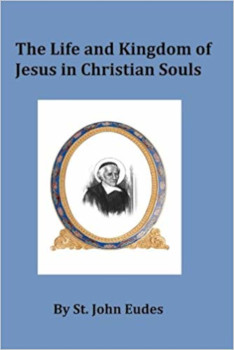
The Life and Kingdom of Jesus in Christian Souls
By St. John Eudes
$17.95
Authored by Saint John Eudes, Introduction by Fulton J Sheen According to the Roman Breviary, Saint John Eudes is the author of devotion to both the Sacred Heart of Jesus and the Immaculate Heart of Mary. His two works on these two devotions are classics. However, he is also a master to the spiritual life; an unknown master. Many are familiar with the works of Saint Bonaventure, Saint Alphonsus Ligouri and Saint Louis de Montfort to name just three of the masters of the spiritual life. And yet, Saint John Eudes has a lot to contribute.
Will the Real Catholic Church Stand Up?
Kindle $2.99 / Paperback $9.95
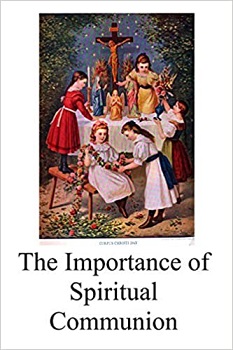
The Importance of Spiritual Communion
Kindle $2.99 / Paperback $5.99
If we cannot receive Holy Communion actually, then let us do so spiritually. These prayers and instructions have been gathered from the Saints and other venerated spiritual writers. Spiritual Communion has been a part of the spiritual life for decades. Growing up I was instructed to make a Spiritual Communion, when I could not go to Communion such as when I assisted at a second Mass. The same is true if one finds oneself at Mass, but not fasting. There are times coming, when it will be difficult, if not impossible to assist at the Holy Sacrifice of the Mass. We should be prepared for such times.
For More Good Traditional Catholic Books:

Old Jud's Pure Maple Candy

The classic you've been asking for! So simple to make and so good!Ingredients
2 cups pure maple syrup
½ cup chopped walnuts (Optional)
Directions
1. In a large heavy-bottomed saucepan, bring the maple syrup to a boil over medium-high heat stirring occasionally. Boil until syrup reaches 235 degrees F (110 degrees C) on a candy thermometer.
2. Remove from heat and cool to 175 degrees F (80 degrees C) without stirring, about 10 minutes.
3. Stir mixture rapidly with a wooden spoon for about 5 minutes until the color turns lighter and mixture becomes thick and creamy. Stir in chopped nuts, if desired.
4. Pour into molds. Set aside to cool. Once cool, unmold candy. Store in airtight containers up to 1 month.
Roasted Pumpkin Seeds

1.5 cups raw whole pumpkin seeds
2 teaspoons butter, melted
1 pinch salt
Directions
Preheat oven to 300 degrees F (150 degrees C).
Toss seeds in a bowl with the melted butter and salt. Spread the seeds in a single layer on a baking sheet and bake for about 45 minutes or until golden brown; stir occasionally. Enjoy!
Video sermons and instructions: Timeless timely truths for living the Faith
Christ the King 2010
19th Sunday after Pentecost 2011
18th Sunday after Pentecost 2013
To God Be The Glory
Lamp & Light Bible Study - Matthew 12

Encouragement for Today
Therefore encourage one another and build one another up.... I Thessalonians 5:11
We believe that through our assorted podcasts, Vlogs, audio downloads and devotional blogs, you will find an assorted Treasure Chest of...
- Sermons
- Classic Catholic Audio Books.
- Devotionals
- Scripture Studies
- Catechism Lessons
- Old-Time Christian radio programs
- Catholic Videos
...that will be a help in your faithful walk with the Lord.
LEARN MORE AT THE ENCOURAGEMENT FOR TODAY WEBSITE: https://www.encouragementfortoday.com
JOSEPH IN THE BOOK OF BEGINNINGS
"And Joseph took an oath of the children of Israel, saying, God will surely visit you, and ye shall carry up my bones from hence. And he died being a hundred and ten years old. And being embalmed he was laid in a coffin in Egypt." - Genesis 50:24-26
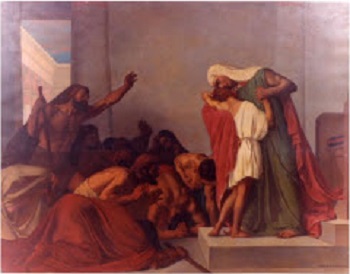
Genesis is a big book. There are strong reasons why this book has always been considered to be one book rather than two. One reason for creationists to be glad of this is that chapters 12 through 50 are clearly written in a historical narrative style. And chapters 1 through 11 are in the same style. So it is not consistent to consider chapters 12 through 50 to be history while interpreting the early chapters as poetry or allegory.
From chapter 12 onward, the narrative is about Abraham, Isaac, and Jacob. God made an important covenant with Abraham, which He then renewed with Isaac and Jacob. So many commentators can see the point of these accounts in this book of beginnings. But what about Joseph? God did not restate His covenant for Joseph – though clearly it was still in force. Not only that, but God’s purposes in salvation were not even to be through Joseph’s descendants – that honor would go to Joseph’s brother Judah.
For me, it seems that the account about Joseph was about God using Abraham’s descendants within what would become a normal world setting. Joseph’s ancestors had lived much longer than he did. Joseph was 110 when he died – not an excessive age when compared to today. His age fits into the patriarchal curve that we can develop from Genesis 11 and shows how the truth of the creation account is vital to our understanding of the rest of biblical history.
Prayer: Thank You, Lord, that every account we read in Your wonderful Bible is true and is there for a reason. Amen.
Catechism Catch-Up
And Forgive Us Our Debts, As We Also Forgive Our Debtors.
“And forgive us our debts, as we also forgive our debtors.” Matthew 6:12
Before we begin: Which is more difficult for you: asking God to forgive you or forgiving a person who has sinned against you?
The fifth petition of the Lord’s Prayer seems simple enough, but simple things can sometimes be very deep. These are the words of Jesus: “forgive us our debts, as we also forgive our debtors." Everyone agrees that this is a difficult word from the Lord. It is hard to understand and even harder to apply. Our basic problem is quite simple: It appears that the Lord has drawn something into this prayer that does not belong there. We would understand this petition perfectly if it read, “forgive us our debts,” and just stopped right there. That would make sense. We all understand that we need to confess our sins and ask for forgiveness. We know that confession and repentance are part of what prayer is all about.
What makes this prayer so frustrating is that Jesus seems to drag in something that doesn’t belong when he adds the phrase “as we also forgive our debtors.” At first glance, there doesn’t seem to be any necessary connection between the first part of the petition and the second part.
Grace or Works?
It seems as if Jesus is saying, “The way you treat other people is the way God will treat you.” On one level that thought is puzzling; on another it is profoundly disquieting. On still another level it appears to present a major theological difficulty. Why does Jesus say that we should pray to be forgiven as we forgive others? Why would Almighty God tie himself to what we do on earth? I think that’s a very good question.
So this petition is puzzling, difficult, and one that bothers every sincere thinker. It makes you wonder what Jesus really meant. Is Jesus here teaching that God’s forgiveness is conditional? Is he teaching us that our forgiveness with God is somehow predicated on our forgiving other people? It would appear at first reading that that is indeed what he is teaching. If so, is this not teaching us that forgiveness is a work by which we gain God’s favor? What then happens to the great biblical doctrine of the grace of God? When it comes to forgiveness, who takes the first step-God or man?
Indeed, this is a difficult text of Scripture. Because it is difficult, let me state my conclusion at the very beginning of this message. This verse means exactly what it says. The teaching of this verse can be given in one simple sentence: Unless you forgive, God will not forgive you. I repeat, this verse means exactly what it says. There is nothing hidden here; there is nothing tricky here. Jesus is saying that unless you forgive, you will not be forgiven.
Augustine called this text “a terrible petition.”
He pointed out that if you pray these words while harboring an unforgiving spirit, you are actually asking God not to forgive you. Ponder that for a moment. If you pray “forgive us our debts, as we also forgive our debtors.” while refusing to forgive those who have wronged you, this prayer which is meant to be a blessing becomes a self-inflicted curse. In that case you are really saying, “O God, since I have not forgiven my brother, please do not forgive me.” That is why one famous preacher said that if you pray the Lord’s Prayer with an unforgiving spirit, you have virtually signed your own “Death-warrant."
There was a missionary in the American colonies-primarily in the area that would become the state of Georgia. There was a general with whom this missionary had some dealings. The General was a great military leader, but he had a reputation as a harsh and brutal man. One day he said to the missionary, “I never forgive.” To which the missionary replied, “Then, sir, I hope you never sin.”
When we pray, “forgive us our debts, as we also forgive our debtors,” we are asking God to forgive our sins according to the same standard we have used in forgiving the sins of others. There are 11 words in the text, but only one of them is important for our purposes. It’s the little word “as.” Everything hangs on the meaning of that word. “As” is the conjunction that joins the first half of the petition with the second half. When Jesus says “as,” he is setting up a comparison between the way we forgive and the way God forgives us. This text says that we set the standard and then God follows the standard. We establish the pattern and then God follows that pattern in the way he deals with us. When you pray this prayer you are really saying, “O God, deal with me as I deal with other people. Deal with me as I have dealt with others.” We are virtually saying, “O God, I’ve got a neighbor and I did some favors for my neighbor and my neighbor is ungrateful to me for all I have done. I am angry at my neighbor and I will not forgive him for his ingratitude. Now deal with me as I have dealt with my neighbor." It’s as if we’re praying, “O God, that man hurt me. I am so angry I can’t wait to get even. Deal with me as I have dealt with him.” We set the standard and God follows our lead.
Unless you forgive you will not be forgiven. These are the words of C. S. Lewis:
No part of his teaching is clearer: And there are no exceptions to it. He doesn’t say that we are to forgive other people’s sins providing they are not too frightful, or providing there are extenuating circumstances, or anything of that sort. We are to forgive them all, however spiteful, however mean, however often they are repeated. If we don’t, we shall be forgiven none of our own (Fern-Seeds and Elephants, pp. 39-49).
To refuse to forgive someone else and then to ask God for forgiveness is a kind of spiritual schizophrenia.
You are asking God to give you what you are unwilling to give to someone else. The fifth petition of the Lord’s Prayer tells us you cannot have it both ways. Do you want to be forgiven? You must forgive others. Unless you forgive you will not be forgiven.
But does the Bible really teach that God’s forgiveness of us is somehow linked to our forgiveness of others? Yes, indeed it does. Let’s go back to the words of Jesus. The 5th petition is in verse 12. Now drop down two verses. The Lord’s Prayer is over but Jesus is still speaking.
For if you will forgive men their offences, your heavenly Father will forgive you also your offences.
But if you will not forgive men, neither will your Father forgive you your offences. (Matthew 6:14-15)
I call one crucial fact to your attention: Jesus has just given us the Lord’s prayer and the only part that he singles out for additional commentary is the 5th petition. All the others he leaves alone. I believe he offered further commentary because he knew that we would feel uncomfortable with this part of the Lord’s Prayer. He knew that we would try to wiggle out from under it. That is why in verses 14-15 he spells it out so clearly that no one can doubt it.
In case you doubt what I am saying, consider the story Jesus told in Matthew 18:21-35.
Then came Peter unto him and said: Lord, how often shall my brother offend against me, and I forgive him? till seven times?Jesus saith to him: I say not to thee, till seven times; but till seventy times seven times. (vv. 21-22).
That’s 490 times. The clunk you just heard is Peter dropping over in a dead faint. He can’t believe his ears. Then Jesus went on to give a parable: Therefore is the kingdom of heaven likened to a king, who would take an account of his servants. And when he had begun to take the account, one was brought to him, that owed him ten thousand talents. And as he had not wherewith to pay it, his lord commanded that he should be sold, and his wife and children and all that he had, and payment to be made. But that servant falling down, besought him, saying: Have patience with me, and I will pay thee all. (vv. 23-26).
Once upon a time there was a great king who ruled a vast realm. He was a man of extraordinary wealth-perhaps the richest person in the entire world. He had a steward-a man who worked for him, a man who was in charge of his entire legal and financial affairs. The king said to the steward, “Take care of everything for me.” And the king went about his affairs, leaving everything in the hands of his servant. Evidently the king didn’t pay very close attention to what his servant was doing. While the king was otherwise occupied, his servant ran up a debt of ten thousand talents, which would be like $25 million. How do you run up a tab of $25 million? We don’t know how he did it, but he may have been running some sort of tax scam where he overcharged for taxes and kept the overage for himself. At length the day came when the king wanted an accounting. His CPAs ran the numbers, called the man in before the king, and delivered the bad news. “Your Majesty, this man owes you $25 million.” When the king asks, “How much money do you have?” the man answers, “I’m sorry, O King, but I’m broke.” That’s the second amazing fact of the story. First, he runs up his huge debt totally undetected, and then somehow he manages to spend it all. Wasn’t anyone paying attention? Not only did he steal that much money, he spent that much money. He is both sinful and stupid. This man doesn’t have anything with which to pay back the great debt to the king. So the king says, “You are going to have to pay me back.” The man falls on his knees and begs for mercy. He says something that again proves his stupidity, “Your Highness, give me time and I will pay back every-thing I owe you.” That’s crazy. He couldn’t pay back what he owed in twenty lifetimes. But something moved the heart of the king to mercy and compassion. The Bible says that the king forgave the man the $25 million debt when he could have punished him. Forgave him when he could have thrown him in jail. Forgave him when he could have had his life. He forgave him and this man who owed everything got up and walked away a free man. His debt had been wiped away.
But that’s not the end of the story.
But when that servant was gone out, he found one of his fellow servants that owed him an hundred pence. (100 pence would be like owing $5000 compared to $25 million. It’s a relatively small amount of money.) He grabbed him and began to choke him. “Pay what thou owest” he demanded. His fellow servant fell to his knees and begged him, “Have patience with me, and I will pay thee all.” (vv. 28-29).
Verse 29 is an exact replay of verse 26. This poor fellow who owes $5000 begs for mercy using exactly the same words the first servant had used before the king.
And he would not: but went and cast him into prison, till he paid the debt.
Now his fellow servants seeing what was done, were very much grieved, and they came and told their lord all that was done.
Then his lord called him; and said to him: Thou wicked servant, I forgave thee all the debt, because thou besoughtest me:
Shouldst not thou then have had compassion also on thy fellow servant, even as I had compassion on thee? (vv. 30-33)
That last phrase is really the point of this whole story. “Shouldn’t you have had mercy on him just like I had mercy on you?” The answer, of course, is yes. The shocking thing was not that this man wanted the $5000 debt paid back. The shocking thing was that he was so unforgiving after having received such great mercy himself. What the king is saying is “I forgave your $25 million debt, couldn’t you have forgiven a measly $5000 debt?” This time the king is not going to be calm and he is not going to be conned a second time. This time the king is not going to believe some sob story. Verse 34 says “And his lord being angry, delivered him to the torturers until he paid all the debt.” The moral of the story is in verse 35. “So also shall my heavenly Father do to you, if you forgive not every one his brother from your hearts.” Please note. These words are for Christians. This is a warning to genuine believers concerning what will happen to them if they refuse to forgive.
In order to understand the full impact of this story, consider this question: Whose forgiveness came first?
Answer: The king’s forgiveness came first. It’s in light of his great forgiveness that this servant’s unforgiving spirit is such a terrible thing. The king in the story is God, and you and I are like that unforgiving servant. We’re called in before Almighty God and when the story of our lives is read, there is a mountain of debt between God and us. It’s so high we can’t get over it, so wide we can’t get around it, so deep we can’t crawl under it. So we fall on our knees and cry out to God, “O God, have mercy on me, have mercy on me for Jesus’ sake.” God looks down at us and he says, “You don’t deserve it but for Jesus’ sake I will forgive you.” In one great moment of grace that mountain of debt is swept away and we rise, we can walk out of the confessional singing to ourselves, “Lord, We Lift Your Name on High.” And just as we are going out to the parking lot we see somebody who has sinned against us. Suddenly the joy disappears and we want to go over and grab them and choke them and say, “Pay me what you owe me.”
No wonder we’re so unhappy. No wonder we’re so frustrated. No wonder we can’t sleep at night. No wonder we have ulcers and back pains and headaches and all kinds of illnesses that come to us. No wonder we carry grudges. No wonder we are depressed and confused. It has happened to us exactly as Jesus said. We suffer because we who have been forgiven have harbored an unforgiving spirit. Jesus said, “When my children refuse to forgive others I hand them over to the torturers who will torture them day and night until they learn to for-give from the heart.” What torturers? The hidden torturers of anger and bitterness that eat your insides out, the torturers of frustration and malice give you ulcers and high blood pressure and migraine headaches, the torturers that make you lie awake at night stewing over every rotten thing that happens to you, the hidden torturers of an unforgiving heart who stalk your trail day and night, who never leave your side, who suck every bit of joy from your heart.
Why? Because you will not forgive from the heart.
The problem is, is that our problem is personal. We don’t see ourselves as very great sinners; therefore, we do not appreciate how greatly God has forgiven us. But when your own sins seem small, the sins of others against you will seem big indeed. The reverse is also true. The greater you see the depth of your sin before God, the less the sins of other people against you will bother you. If you think you’re not much of a sinner, then the offenses of other people are going to appear in your eyes as big. To paraphrase Matthew Henry, “He who relents is he who repents.” Don’t talk about repentance unless you are willing to forgive your brothers and sisters. Unless you are willing to forgive, your repentance is just so much hot air and empty talk. True repentance always starts with a change of mind that leads to a change of heart that leads to a change (in this case) in the way we view those who have sinned against us.
Jesus is telling us that there is a vital link between the way you treat other people and the way God in heaven is going to treat you. Let’s face it. We don’t like that. We’d much prefer if we could just have our relationship with God insulated so we could treat other people any way we like. Jesus says, “No deal. You can’t have it that way." Unless you forgive you will not be forgiven. This is a hard word, isn’t it? But it is a hard word of grace. Many of us desperately need to take a searching moral inventory and ask ourselves some serious questions:
Am I up to date on my forgiving?
Am I holding a grudge against anyone?
Do I harbor any bitterness against any person?
Have I forgiven those who have hurt me deeply?
Someone says, “But I can’t forgive.” No, don’t ever say that. The word “can’t” is a cop-out. The issue is deeper than that. You won’t forgive. Don’t make excuses and don’t play games. If you are a true Christian, a genuine believer in Jesus Christ, if your sins have been washed away, then you can forgive. What God has done for you, you can do for others. There may be some people who won’t forgive. As long as you won’t forgive you’re better off if you never pray the Lord’s Prayer because unless you forgive you will not be forgiven.
And in all of this we have the example of our Lord Jesus Christ who when he was crucified-the innocent for the guilty-the just for the unjust-the righteous for the unrighteous-Jesus, who was murdered at the hands of wicked men, as he hung on the cross cried out, "Father, forgive them for they know not what they do” (Luke 23:34).
READ MORE FROM THE TRADITIONAL CATECHISM AT THE WEBSITE: https://www.traditionalcatechism.com
Living Catholic:
Five Different Types Of Fools

In the Old Testament, the word fool is actually a translation of five different Hebrew words that reflect subtle differences in “types” of fools. Unfortunately, the English translation makes it more difficult to identify the characteristics of five types of fools, but with a careful search of Scripture these differences can be distinguished.
Wise counselors—parents, pastors, spiritual directors, friends, spouses—need to understand the progression of rebellion that is reflected in the Bible’s description of fools. If you learn to perceive the characteristics of a simple fool, silly fool, sensual fool, scorning fool, and steadfast fool, you will be equipped to identify and respond to such fools with wisdom and discernment.
The Simple Fool
The Hebrew word for “simple [fool]” is pethîy (peth-EE). The root word from which it is derived, pâthâh, implies extreme vulnerability, literally meaning “to be opened up.” The simple fool opens his mind to any passing thought and opens his arms to any passing stranger. In other words, he lacks discernment. He has an over-simplified view of life and fails to recognize the cause-and-effect sequences that affect every area of life. (See Proverbs 22:3.)
Because the simple fool is not discerning, he is easily captivated by all kinds of enticements and deceptions. He is dangerously immature, extremely gullible, and intensely curious. In the absence of instruction and consistent discipline, the simple fool will naturally become more foolish. A simple fool is especially vulnerable to seduction, lacking an understanding of the irreversible consequences of moral failure. (See Proverbs 7:6–7.)
The Proverbs provide instruction for the simple fool: “The proverbs of Solomon the son of David, king of Israel … give subtlety to the simple [pethîy], to the young man knowledge and understanding” (Proverbs 1:4).
Scorning fools will seek out simple fools and try to become their heroes. Therefore, to protect simple fools from the destructive influence of the scorning fool, it is critical to bring swift correction to scorning fools. “Smite a scorner, and the simple [pethîy] will beware …” (Proverbs 19:25).
The Silly Fool
The Hebrew word that refers to a “silly fool” is ’eviyl (ev-EEL). Its definition is “to be perverse, silly.” The mouth of a silly fool often gets him in trouble. “Wise men lay up knowledge: but the mouth of the foolish [’eviyl] is near destruction” (Proverbs 10:14; see also Proverbs 20:3). When things go wrong for a silly fool, he becomes angry, resulting in more damage. “A stone is heavy, and the sand weighty; but the anger of a fool [’eviyl] heavier than them both” (Proverbs 27:3).
A silly fool believes that his own way of thinking is right (see Proverbs 12:15), so much so that he reacts to instruction when it is offered: “The fear of the Lord is the beginning of knowledge: but fools [’eviyl] despise wisdom and instruction” (Proverbs 1:7; see also Proverbs 10:21). Argument, persuasion, and advice from well-meaning friends fail to convince silly fools of error. Proper correction by authorities, which publicly shames the silly fool, will more often be effective in helping him change his ways. (See Proverbs 29:9 and Proverbs 7:22.)
The Sensual Fool
One who rejects the correction of parents or other authorities will become a sensual fool. This type of fool is identified in Scripture with the Hebrew word kecîyl (kess-EEL), which means “fat, i.e. stupid or silly.” The word denotes a person who seems determined to make wrong choices. He does not have a mental deficiency, but rather rejects the wisdom of God.
The sensual fool’s focus is on that which brings him immediate pleasure. He glories in that of which he should be ashamed. “It is as sport to a fool [kecîyl] to do mischief … ” (Proverbs 10:23; see also Proverbs 13:19–20).
A sensual fool is unreasonable. As a silly fool, his mouth got him into trouble. Now, as a sensual fool, his mouth gets him into more trouble. “A fool’s [kecîyl] lips enter into contention, and his mouth calleth for strokes [blows]. A fool’s [kecîyl] mouth is his destruction, and his lips are the snare of his soul” (Proverbs 18:6–7).
Scripture gives more warnings about the sensual fool than about any other type of fool. His motives and methods are subtle. He should be avoided, because those who follow him will be led astray. “… A companion of fools [kecîyl] shall be destroyed” (Proverbs 13:20). Severe punishment is prescribed for the sensual fool: “A whip for the horse, a bridle for the ass, and a rod for the fool’s [kecîyl] back” (Proverbs 26:3, see also Proverbs 19:29).
The Scorning Fool
The Hebrew word that denotes a “scorning fool” is lûwts (LOOTS). It means “to make mouths at, i.e. to scoff.” The scorning fool’s facial expressions communicate the disdain and contempt he has in his heart toward his authorities, including parents, civil authorities, and God.
This type of fool not only has rejected truth; he also has embraced that which is abominable to God. Psalm 1:1 describes the progression of foolishness, referring to a man who first walks “in the counsel of the ungodly,” then stands “in the way of sinners,” and finally sits “in the seat of the scornful [lûwts].” The scorning fool utterly detests people and ideas that contradict his false thinking, and he expresses his scorn through derisive attitudes, behavior, and speech.
The scorning fool turns a deaf ear to rebuke: “A wise son heareth his father’s instruction: but a scorner [lûwts] heareth not rebuke” (Proverbs 13:1; see also Proverbs 14:6). Those who attempt to lead the scorning fool away from the path of destruction that he seems determined to follow will suffer his wrath. “A scorner loveth not one that reproveth him: neither will he go unto the wise” (Proverbs 15:12). “He that reproveth a scorner [lûwts] getteth to himself shame: … Reprove not a scorner [lûwts], lest he hate thee: rebuke a wise man, and he will love thee” (Proverbs 9:7–8).
A scorner must be punished—for his own sake and for the sake of those whom he can potentially influence. “Smite a scorner [lûwts], and the simple [pethîy] will beware … ” (Proverbs 19:25). “When the scorner [lûwts] is punished, the simple [pethîy] is made wise … ” (Proverbs 21:11; see also Proverbs 22:10).
The Steadfast Fool
The most dangerous type of fool is a steadfast fool. The Hebrew word nâbâl (naw-BAWL), which means “stupid, wicked,” identifies this type of person. Elsewhere in the Old Testament, nâbâl also is translated as vile person.
A steadfast fool totally rejects God and His ways. “The fool [nâbâl] hath said in his heart, There is no God. They are corrupt, they have done abominable works, there is none that doeth good” (Psalm 14:1). This type of fool is self-confident and close-minded. He is his own god, freely gratifying his lower nature. It is his goal to draw as many others as possible into his evil ways. Attempts to reprove him will be futile and bring frustration to the one who tries to influence him. Only God can successfully reprove a steadfast fool.
Choose Wisdom; Reject Foolishness
In Proverbs 1:22, wisdom declares: “How long, ye simple ones, will ye love simplicity? and the scorners delight in their scorning, and fools hate knowledge? Turn you at my reproof: behold, I will pour out my spirit unto you. I will make known my words unto you. … The turning away of the simple shall slay them, and the prosperity of fools shall destroy them. But whoso hearkeneth unto me shall dwell safely, and shall be quiet from fear of evil.” Let us heed this declaration and “walk circumspectly, not as fools, but as wise” (Ephesians 5:15; see also Proverbs 1:7, 3:35).
To Learn More Principles For Life Go To: Resources: Principles of Life


Pray for the Holy Father! Pray with the Holy Father!
- Your prayers are asked this month and every month for the intentions of the Holy Father, Pope Michael.
- Pray for the Holy Father in the preparation for the tenth anniversary of His Holiness' Coronation on Friday, December 10, 2021.
- Please pray for the success and growth of the new Chrysostom Bible Institute. Check out the wonderful work it is doing and see how you can get involved!
- Your prayers and support are asked in a special way for the soon to be established House of Prayer.
- Pray especially that the Holy Ghost inspires and helps us prepare spiritual manuals and days of recollection to make available to all.
- Keep in your prayers our Podcast Ministry, a new way to reach out in the missionary work of the Church! We ask for prayers for our other activities world wide. We have made good contacts in the Philippines and Japan and ask prayers that these contacts will bear much fruit for the salvation of souls.
- Be sure to keep St. Helen Catholic Mission in your prayers. Why not go on over to the site now and see what they have to offer and how you might be able to help!
- Also we ask you to keep in prayer our increasing missionary work in the United States and elsewhere.
- Pray for those outside the Church and those who do not know God, that they may see the light of grace and be led safely home to the refuge of the Holy Catholic Church.
- As always, we also ask that you pray for yourself! Never forget your own state of soul. God is calling you to His service in His love. We know that our Lord can count on you to answer.
- We are all praying especially for you, too. May you correspond with every grace of God!
- In what other needs or intentions may we pray for you? Let us know!
- Let us remember that the Church runs on prayer. Without your prayers, God will not work in hearts and souls to bring them to a knowledge of the truth. (I Timothy 2:4)


To Donate online go to:

To Donate by Mail:
Our address is
Vatican in Exile
829 NE Chester
Topeka, Kansas 66616
Make Checks payable to:
Vatican in Exile


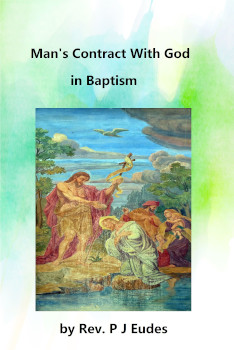











 Follow
Follow


